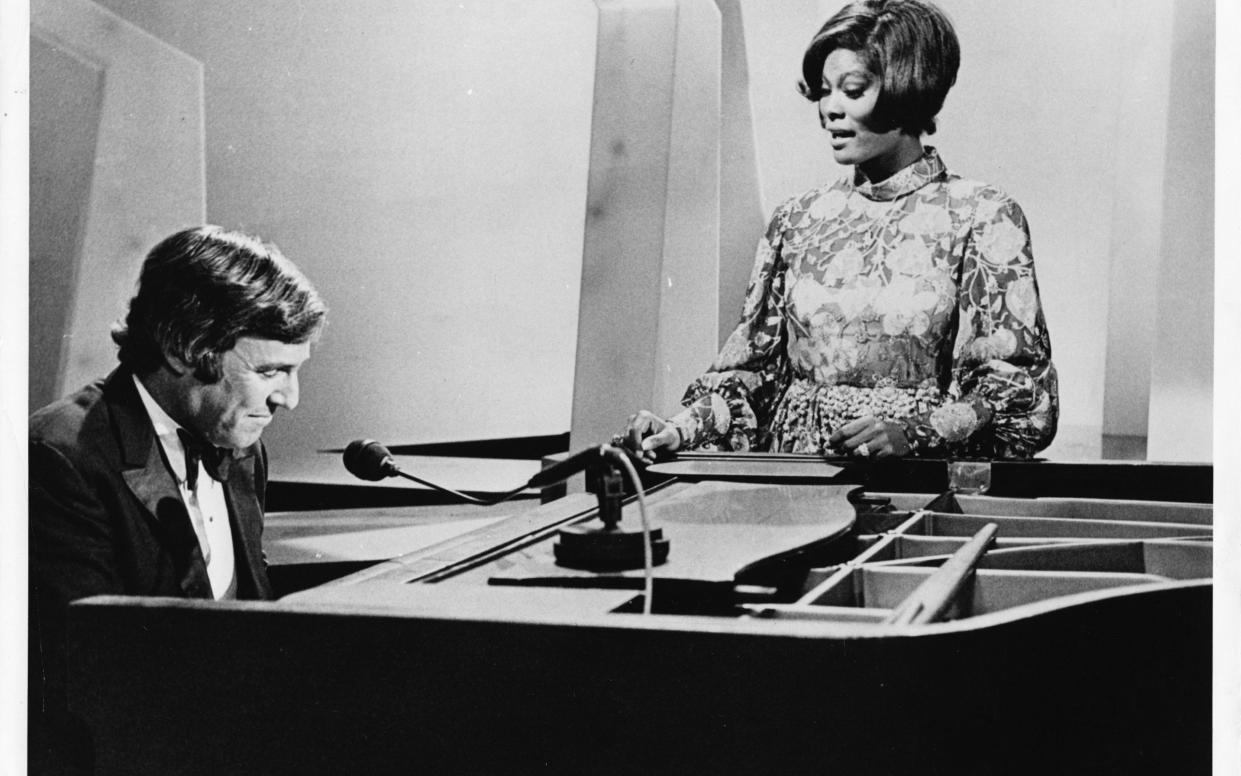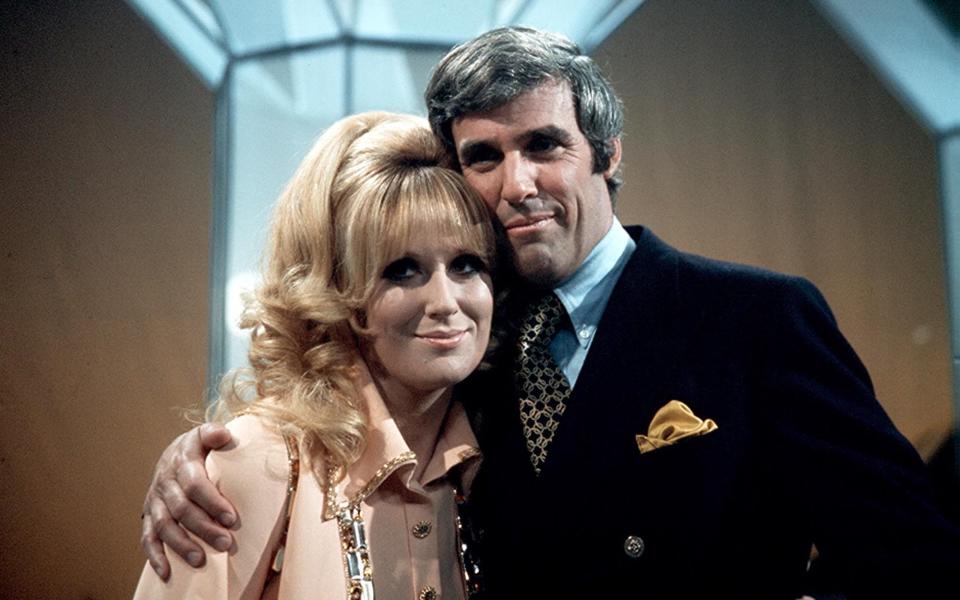Burt Bacharach turned the art of pop into high sophistication

- Oops!Something went wrong.Please try again later.
- Oops!Something went wrong.Please try again later.
- Oops!Something went wrong.Please try again later.
- Oops!Something went wrong.Please try again later.
Burt Bacharach was the greatest. In terms of creating pop music of the deepest melodic, harmonic and rhythmic sophistication, Bacharach is still the benchmark, a supernaturally gifted composer and arranger who pushed the song form into extraordinary places and left listeners gasping at the sheer beauty of it all. Anyone who had a heart could tell you that.
In his prime, he was lazily characterised as the King of Easy Listening, a title he was (ironically) uneasy with. He was fond of pointing out that there was nothing easy about playing his music, with its complex modulations and unusual shifts of time signatures. “All my music is serious,” he told me, when I met him in 2005. “I don’t make ear candy.”
Well, the King is dead, at the venerable old age of 94. But it is not remotely fanciful to suggest that the songs he has left behind will be sung as long as there are voices to sing them.
He has been one of songwriters of choice for some of the greatest voices the world has ever heard, Dionne Warwick, Aretha Franklin, Dusty Springfield to name but three incredible women with pliant tones and huge ranges that could invest so much into his flowing melodies. Tom Jones, Elvis Presley, Scott Walker and Gene Pitney were amongst the incredible male singers who sang definitive versions of his songs.
The body of work Bacharach created with lyricist Hal David in their 1960s and 1970s prime is so phenomenal, it beggars belief. Make It Easy on Yourself, Walk on By, I Say a Little Prayer, I’ll Never Fall in Love Again, Do You Know the Way to San Jose, Trains and Boats and Planes, The Look of Love, Raindrops Keep Falling On My Head…
Just to list such titles sends melodies ringing through the air. And the list goes on and on. There’s Always Something There to Remind Me, Wishin’ and Hopin’, Close to You, I Just Don’t Know What to Do With Myself, 24 Hours From Tulsa, What the World Needs Now Is Love … Bacharach wrote hundreds of impossibly beautiful songs, that have been recorded thousands of times.
What is it about Bacharach’s melodies and arrangements that exerts such fascination and retains such a power to move us? His sense of orchestration was bold and original, the way he conjured up unexpected alliances of oboes and castanets and clavichords, often married to choral backing vocal singing. He was rhythmically adventurous, essentially keeping swing alive in the age of rock and roll. But really, he just had the magic flow. Bacharach’s songs don’t follow obvious chord progressions, stretch all the standard rules, yet never venture so far into the realm of experimentalism or jazz that they loosen their grip on melody, or forsake connection with emotion.
It helps, of course, that in those glory years he was working with a lyricist of such profundity and skill as Hal David. I once had the chance to ask the great Dionne Warwick (who sang original versions of many of the teams finest songs), about their partnership. “Hal David, as far as I’m concerned, is the greatest lyricist that ever put pen to paper,” she insisted. “He wrote poems, prose, vignettes, things that people want to say but may not have the capacity, he could put it all into a nutshell, wrapped up with a beginning, middle and end.”

As for Bacharach, “his melodies are completely unorthodox, nothing like anyone had ever heard at that time. He took liberties, and rightfully so, he was a composer who felt if he wanted to change from a 4 /4 bar to a 3 / 4 bar he could do it. And if your ear is attuned, it was wonderful. If not, get used to it! That was his attitude. I found it interesting and challenging, singing his melodies was like taking a music exam every time I went into the studio.”
Bacharach and David met at the famous Brill Building in 1957, when it was the creative hub of songwriting and publishing. Young talents in their 20s, Bacharach was a pianist and arranger with a background in jazz and classical music, David was an up and coming lyricist working in Hollywood and Broadway. Their first hit was a country song, The Story of My Life, sung by Marty Robbins in 1958. Not long after that, Perry Como recorded Magic Moments, and the team were off on a hot streak perhaps unequalled by any other songwriting partnership bar Lennon and McCartney, Goffin and King and Bernie Taupin and Elton John. Across his lifetime, Bacharach was credited on over 70 top 40 hits in the US.
Bacharach could be a stern taskmaster and absolute perfectionist. When Cilla Black recorded (What’s It All About) Alfie for the 1966 Michael Caine movie, Bacharach made her sing it almost 30 times, until she barely had a voice left. “I kept thinking we can get it a little better,” he later said, though they ended up using one of the early takes. But then, who cares whether the session was stressful, or how many takes it took? What we have been left with is a song and performance of aching, lovelorn beauty.
When we think of Bacharach, we mainly think about romance, because he had such a way with romantic ballads. But he also wrote quite a lot of novelty songs, including Three Wheels on My Wagon (with lyricist Bob Hilliard, who also co-wrote Any Day Now) and What’s New Pussycat? (with Hal David). Tom Jones once told me he was appalled when Bacharach first asked him to sing Pussycat, the title song for a Peter Sellars comedy. “I thought he was pulling my leg. I said, ‘You’re joking, right?’ He said ‘It’s a crazy song for a crazy film. Open your mind and sing it like you mean it.” The rest is pop history.
It was that kind of eccentric brassiness alongside that Mike Myers tapped into when he recruited Bacharach to work on the soundtracks for his trio of Austin Powers pastiche spy movies in between 1997 and 2002. “I can't tell you what that's done for my career,” Bacharach later noted, only half joking. “All the 7-year-olds suddenly knew my music.”

The dream team of Bacharach and David broke up in 1973, falling out over a musical version of Lost Horizon that got panned by critics. They were supposed to be creating songs for a new Dionne Warwick album, and soon lawsuits were flying in every direction. “Over the years we’ve all grown and matured and Burt has taken the blame, because he was the one,” Warwick told me in 2012. “It’s something called ego. We all have one. Some larger than others. He thought we had gone as far as we could and never asked whether we agreed or not. He was flat out wrong but I’m happy that he grew enough to recognise the truth.”
It is fair to say Bacharach had quite a colourful love life. His four marriages included movie star Angie Dickinson and lyricist Carole Bayer Sager, with whom he crafted a fistful of 1980s hits, including Best That You Can Do, the theme for Dudley Moore comedy Arthur. Arguably, there were few lyricists capable of the depth and complexity that could bring the best out of Bacharach, but he did some very fine work with Elvis Costello in the late nineties. Their ballad God Give Me Strength is as great as any in the Bacharach canon.
In later life, the great man had mellowed somewhat. He occasionally toured, reciting the lyrics of his songs in a croaky voice. He wasn’t much of a singer, and yet he was such a fantastic band leader, and the songs themselves were so bulletproof, that his ancient, dry voice talk-singing through A House is Not a Home was devastating. No one who ever saw Burt Bacharach perform could doubt they were in the presence of genius.

He was 77 when I met him, thin and wrinkled, and joking that his box of health supplements were “all that keeps me going these days.” He was, incredibly, promoting a new solo album, At This Time, of hip hop related music, created with Dr Dre, and he was full of energy talking about the possibilities he heard in the urban genre. “Harmonically, the challenge is thrown down - can you write a verse and chorus over the same four bar loop? Get those jagged strings, work over the bassline, there's a lot of polytonal, dissonant writing in there, it's passionate, it's got an energy." It is an extraordinary album, worth an hour of any music lover’s time.
Yet there was also a tinge of regret about him in those later years. "If I come up with a song,” he offered, apropos of nothing, “they always say it's not as good as I'll Never Fall in Love Again or Anyone Who Had a Heart."
But then, you could say the same of every other songwriter who ever lived. Burt Bacharach set a standard all songwriters are still measured by, and will be for a very long time to come.

